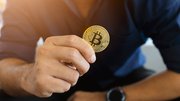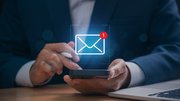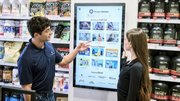Article
Barnes & Noble Nook raises questions about digital-only products
Technology has made it possible to deliver music, movies, books and more without a physical product. But is that good for shoppers or retailers?

November 5, 2009 by James Bickers — Editor, Networld Alliance
With the recent launch of Barnes & Noble's Nook e-reader device, consumers have yet another way to purchase products that are completely digital — no tangible product to take home. The trend that started for most consumers with the iTunes store has zig-zagged across industries, from music to movies to video games to books.
The Nook was met with skepticism from stock analysts, many of whom downgraded B&N on the announcement — why, they asked, would a bookseller want to create a device that encourages shoppers to stay out of the bookstore?
 "We've addressed that from the get-go," said Douglas Gottlieb, vice president of digital products for Barnes & Noble. He said the Nook is far more than just a way to download and read books, but also a way to interact with the in-store environment. "Nook and the store experience go incredibly well together."
"We've addressed that from the get-go," said Douglas Gottlieb, vice president of digital products for Barnes & Noble. He said the Nook is far more than just a way to download and read books, but also a way to interact with the in-store environment. "Nook and the store experience go incredibly well together."
For instance, walk into a B&N location carrying your Nook and you'll automatically be connected to the free wireless network. And while you're in the store, you have access to complete book browsing — every book for which a digital version exists suddenly becomes available on your device for as long as you're in the store.
Gottlieb also said there is exclusive content on the way for Nook owners, but couldn't get specific, saying only that "some full titles, all sorts of really interesting things" are on the way.
Games on the Go
 Another new mobile entertainment device is getting wary glances from both consumers and retailers. The Sony PSP Go, launched in the United States and Europe on Oct. 1, is a departure from previous versions of the hand-held game machine in that it does not support physical software — there is no optical drive, which means all games must be downloaded.
Another new mobile entertainment device is getting wary glances from both consumers and retailers. The Sony PSP Go, launched in the United States and Europe on Oct. 1, is a departure from previous versions of the hand-held game machine in that it does not support physical software — there is no optical drive, which means all games must be downloaded.
That alone is enough to win it the scorn of video game retailers, who make most of their money on software sales. But according to Larry Plotnick, chief executive of third-largest U.S. video game retailer Play N Trade, that's not the only thing the PSP Go has going against it.
"The PSP Go is a significantly more expensive hand-held system with fewer available games, and no way for the consumer to play his PSP games already purchased," he said. "The cost of new games is the same as a new game for the PSP or DS, with no asset owned by the consumer, meaning they can never trade it in, they cannot play it on another system, or move it to a new system if it breaks. (It's) not a good retail offering."
Plotnick is bearish on the concept of download-only games, and not only as they relate to the PSP Go. Video game retail relies heavily on the trade-in model, which downloadable content effectively wipes out. That means the average gamer will be able to afford fewer games, as most of them finish a game and then "trade up" to a new release — which, he says, drives up demand across the industry.
"The download model has already done serious damage to the music industry, and I believe it would do the same to video games over time," he said.
| ||||||||||||||||||||||
Consumer reaction to digital-only products
While retailers struggle to get a grasp on what digital-only products will ultimately mean for their business, consumers are likewise figuring out what works best for them. Steve Silberberg loves digital books — he thinks they are "a far superior information delivery mechanism" and believes they might one day make traditional books obsolete.
Kass Wilson disagrees. As a self-described "over-50 with no children to teach me," she's put off by the sheer number of different devices in play, and the fact that each has a different interface and learning curve. She's also a traditionalist, as many still are, preferring the feel of a "real book" in her hands to an electronic device.
She also speaks to the considerable psychological barrier many shoppers have to the concept.
"Somehow, merely being allowed access feels like you have been cheated," she said. "There is nothing real in my hands to show for that credit card invoice."
Ultimately, neither physical products nor digital ones will go away — the retail landscape of the future will most likely be a mix of the two, with only their relative proportions yet to be determined.
"As an author who faces an ever-increasing world of digital publishing, I find it an addition to, not a replacement of, the traditional holding-the-physical-book-in-your-hand type of reading," said novelist Erin Rainwater. "Personally, I can't conceive of reading from a Kindle-type device, but I readily admit it is more and more popular, and am happy to serve my readership."
Rainwater's next book, due out in June, will be available in both print and electronic formats.
 ChatGPT
ChatGPT Grok
Grok Perplexity
Perplexity Claude
Claude





